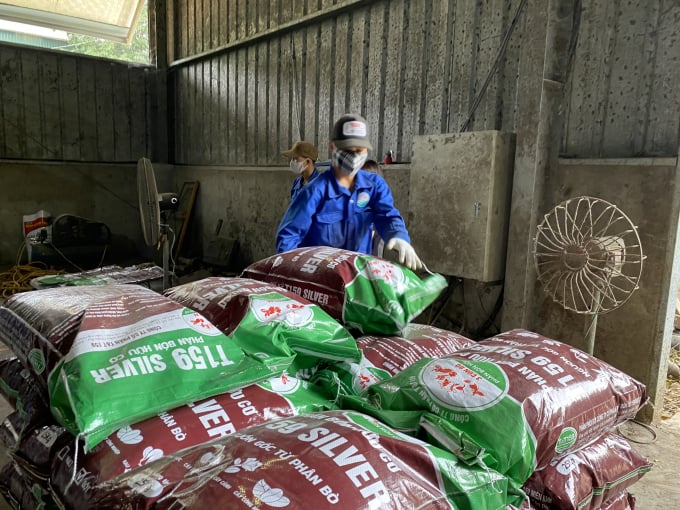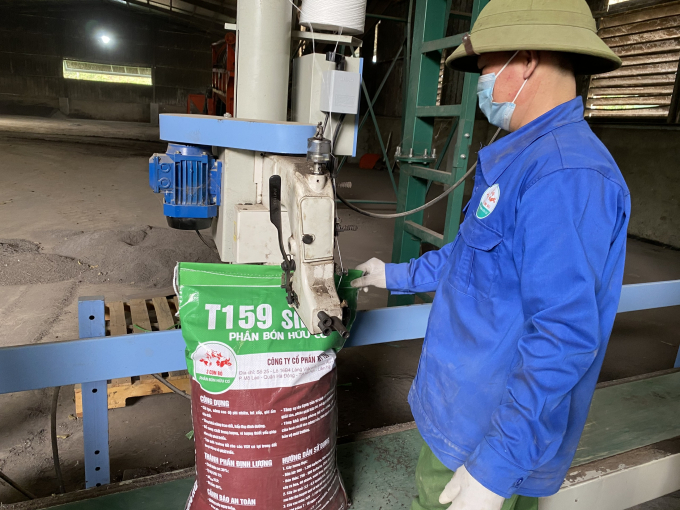November 22, 2025 | 11:59 GMT +7
November 22, 2025 | 11:59 GMT +7
Hotline: 0913.378.918
November 22, 2025 | 11:59 GMT +7
Hotline: 0913.378.918
According to the Vietnam Fertilizer Association, industrial fertilizer is utilized in agricultural output in Vietnam at a rate of over 10 million tons per year, with inorganic fertilizer accounting for three-fourths of that total.
Unbalanced fertilizer use or misuse of inorganic fertilizer is still popular, resulting in decreased agricultural product quality, soil degradation, and environmental damage.
On the other hand, Vietnam produces over 280 million tons of organic waste yearly from plantation, husbandry, and fishery, which may be used to manufacture ingredients for organic fertilizer. Thus, a circular value chain is created that either benefits the economy or preserves the environment.

According to the Plant Protection Department, there have been 5,580 recognized organic fertilizer products in circulation, an increase of 6 times compared to 2017. Photo: Nguyen Huan.
According to local government statistics, we only consume around 17 million tons of organic fertilizer generated by farming families for agricultural purposes from the aforementioned material sources.
As a result, building sustainable and ecological agriculture with the goal of increasing agricultural quality and value, protecting the environment, and increasing production and use of organic fertilizer is critical for Vietnam agriculture in the medium and long term.
The government has implemented a variety of methods to generate organic fertilizer during the last several years, with some initial success.
It is a legal corridor for organic fertilizers that was largely and synchronously constructed from the Crop Production Law, the Government's Decree on fertilizer management, and Decree 109/2018/ND-CP on organic agriculture. National technical laws on fertilizer quality and, most recently, the Ministry of Agriculture and Rural Production's Directive 117/CT-BNN-BVTV 2020 on promoting the development and use of organic fertilizers.

Organic fertilizer output in the US grew from 1.07 million tons in 2017 to 2.4 million tons in 2020. Photo: Nguyen Huan.
Domestic organic fertilizer manufacturing facilities equipped with current production technology lines are now available via the legal corridors and supportive policies of the Government and MARD.
In which, several firms, including Que Lam, Song Gianh, Tien Nong, and T&T 159..., employed automated and precise control devices to modify environmental factors while also using bacterial strains. Functional organisms enable rapid and efficient processing of organic input materials, hence expanding manufacturing capacity and producing goods of comparable quality to those imported from industrialized nations.
According to the Plant Protection Department and MARD, there are now 5,580 recognized organic fertilizer products on the market, a sixfold increase over 2017.
The whole nation now boasts 265 organic fertilizer manufacturing plants with a combined capacity of more than 4 million tons per year, a 1.7-fold increase in quantity and a 1.4-fold increase in capacity over 2017.
Organic fertilizer output in the US grew from 1.07 million tons in 2017 to 2.4 million tons in 2020.
Translated by Linh Linh
/2025/11/21/4309-2-153400_128.jpg)
(VAN) Green and low-emission rice is paving the way for Vietnamese rice to enter high-end markets, marking the beginning of a transformation journey toward greening and elevating the national rice brand.

(VAN) ‘Right to Win’ outlines a national action plan that shapes a new vision for Viet Nam’s agriculture in an era of renewal and global integration.

(VAN) Lam Dong’s farmed sturgeon output this year is expected to reach 2,300 tons, worth VND 450 billion, affirming the brand’s position on the market.

(VAN) A surge in Ukrainian egg exports, largely driven by soaring sales to the UK over the last few years, has notably pushed up egg prices on the domestic market.

(VAN) The price of Arabica Catimor coffee in Quang Tri is currently at VND 25,000–27,000/kg (fresh cherries), the highest level ever recorded

(VAN) 'From the coffee story, we can think deeper and further about the crop production sector - from development orientations and value-chain organization to international integration,' assessed Dr Le Quoc Doanh.
/2025/11/18/2431-0-161627_248.jpg)
(VAN) Viet Nam accounts for 43% of the world's export volume of Robusta coffee. However, the Vietnamese Robusta coffee brand has yet to gain broad recognition on the global market.